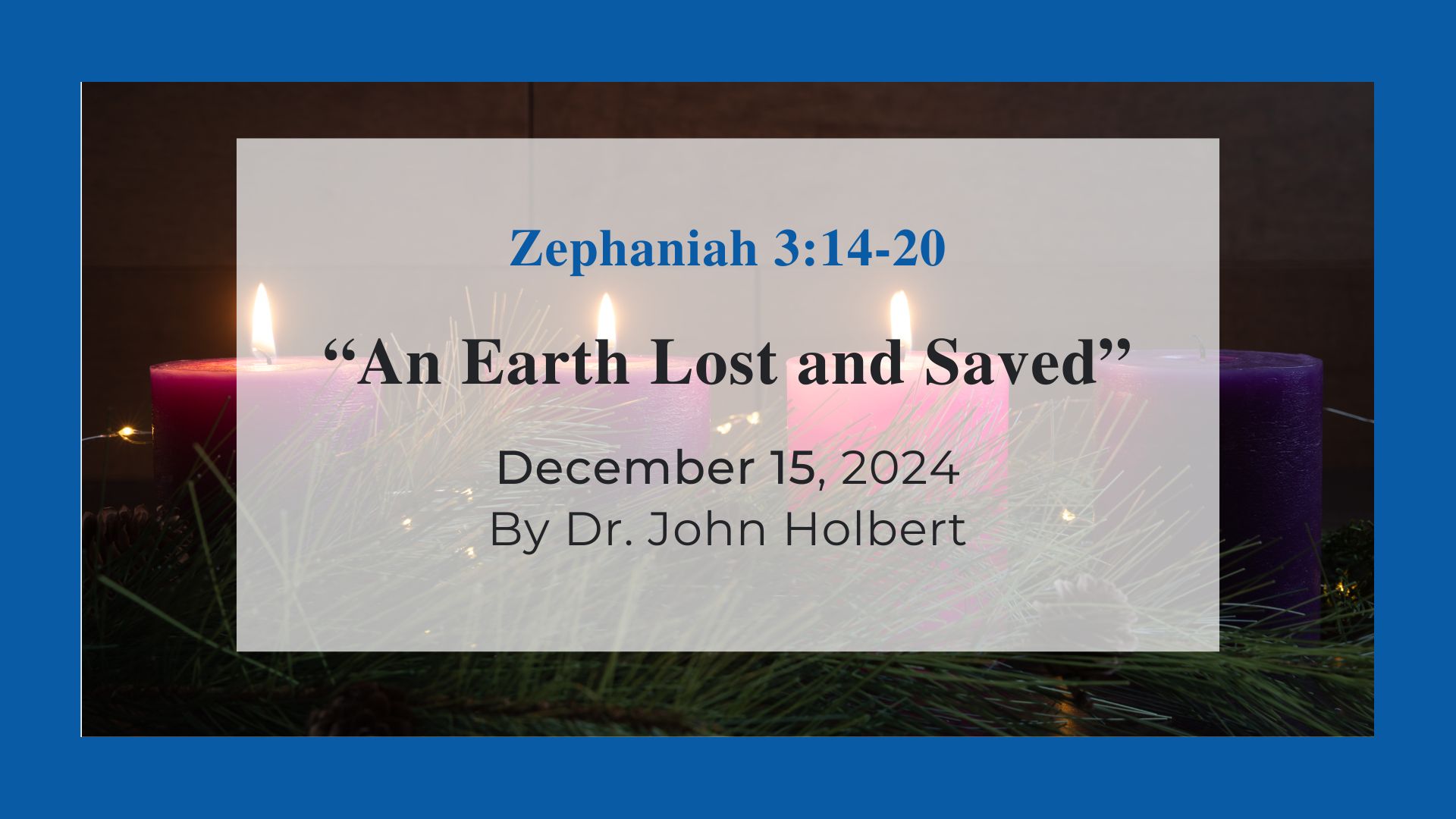An Earth Lost and Saved - Reflections on Zephaniah 3:14-20 for Advent 3 Year C
by John Holbert on Friday, November 29, 2024

The small book of Zephaniah, one of the so-called twelve minor prophets, minor only because they are short, sets its historical context, as several of these prophetic books do, in the opening verse or verses. We are told that Zephaniah was “son of Cushi,” and his lineage moves back to King Hezekiah, a Judean monarch of the 8th-7th century BCE. The work of the prophet is established during the reign of the famous reforming king, Josiah, son of Amon (640-609BCE). During the rule of Josiah a scroll was discovered during the rebuilding of the Jerusalem temple (622BCE), a document that many have connected to the book of Deuteronomy, either in whole or part. After that discovery, and after its authentication by the prophet Huldah, Josiah proceeds to reorder his kingdom, consolidating all worship in Jerusalem, destroying the many worship sites throughout the land, and urging his people to a more serious devotion to YHWH. Given the content of Zephaniah’s oracles, it could be assumed that his prophetic work occurred in the years prior to Josiah’s reforming work.
The first two chapters of the book describe YHWH’s fury at the evil perpetrated by the people of God. He speaks again and again of YHWH’s conviction to “sweep away everything from the face of the earth—humans and animals, birds of the air, and fish of the sea” (Zeph.1:2-3). The prophet describes nothing less than a complete reversal of God’s creation of all things, given its rapturous announcement in Gen.1. Then, in the beginning of Zeph.3, YHWH directs that same anger toward the city of Jerusalem, God’s special gift and hope for Israel.
“The officials within it (the city) are roaring lions;
its judges are nocturnal wolves who leave nothing until morning.
Its prophets are reckless, faithless ones;
its priests have profaned the sacred,
and have done violence to the Torah” (Zeph. 3:3-4).
In short, all leaders, charged with the service of YHWH, God’s government, God’s law courts, God’s spokespersons, the prophets, God’s holy priests, all have impugned their vocations, and thus have incurred the anger of YHWH. Up until Zeph.3:8, the prophet pours out divine-inspired scorn and hatred on the lost people of God’s chosen land.
But Zeph 3:9 brings a very different tone to the prophecy. It could be that Zephaniah has witnessed the cleansing actions of Josiah, how he has attempted to reform the religion and practice of Jerusalem, and responds with the glowing hope of a now pleased YHWH. He turns to beautiful portraits of God’s people returning to a redeemed and altered Jerusalem. The verses sound like many of the pictures one may read in other prophets, recording a God satisfied with the reformation of the people, and who now acts on their behalf, bringing exiles home from all the places where they have fled or been dragged to by their enemies. Zeph.3:10 describes “suppliants, scattered ones beyond the rivers of Ethiopia (that is Cush in Hebrew), who will now bring YHWH offerings. “They shall seek refuge in the name of YHWH—the remnant of Israel shall do no wrong nor utter no lies” (Zeph.3:12-13).
And our text follows on from this overtly positive outlook wherein “daughter Zion, Israel” is commanded to “sing aloud and shout,” because “YHWH has taken away all judgments against you and has turned away your enemies” (Zeph.3:14-15). “I will save the lame and gather the outcast, will change their shame into praise and renown in all the earth” (Zeph.3:19). And finally, “at that time I will bring you home, when I gather you, for I will make you renowned and praised among all the peoples of the earth when I restore your fortunes before your eyes, says YHWH” (Zeph.3:20).
So once again during this season of Advent we turn to biblical passages that speak of a glorious renewal and reformation of the earth under the glorious power of YHWH, a time when all shall be made new and fresh. This is once more the promise of Advent, the announcement of the birth of the child of Bethlehem, whose unexpected coming will do all this and more for those who believe and intend to follow and revere his life.
Still, in the light of this stunning beauty and power, we must never forget the dark days that precede that light, and the horrors of a depraved land that call forth such renewed and reformed spaces. In our 21st century land, we too often witness that darkness, those corrupt officials, lawyers, judges, and priests who despoil and greedily snatch ill-gotten gain from their supposed God-appointed positions. Advent calls us to take with seriousness the deprivations that demand recompense, that call forth the power and justice of God, that call us to act out of that justice, made manifest in the gift of Messiah Jesus to us, urging us to a new and renewed life with him in a transformed world.
